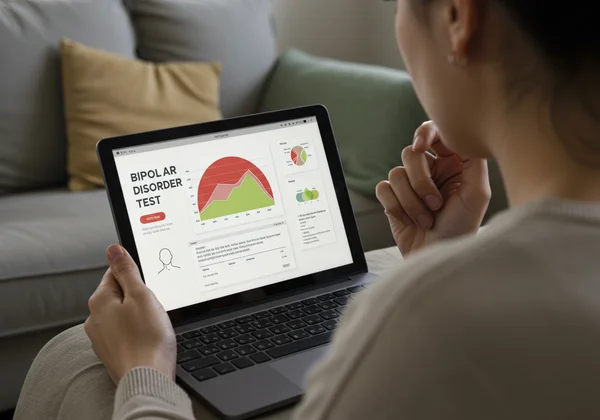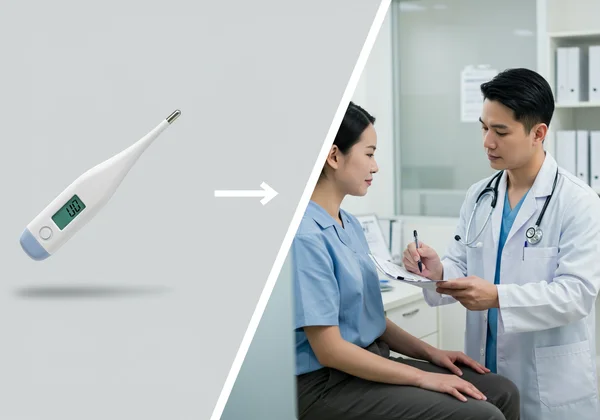Bipolar Disorder Test Results: Your Next Steps to Diagnosis & Care
You’ve just completed an online Bipolar Disorder Test, and now you’re holding the results. Receiving your results can bring mixed emotions – relief, confusion, or even anxiety. But knowing what to do next is key. What do I do with these results? It's a crucial question, and you've come to the right place for a clear, supportive guide. Taking a screening is a courageous first step, and this article will help you understand your results and empower you to take the next confident steps toward a formal evaluation and a path to well-being.
The journey to understanding your mental health is unique to you. An online screening is a powerful tool to begin that journey, providing a private and accessible way to explore your mood patterns. These results act as a guide, showing you where to focus your attention next. Let's walk through how to interpret them and what to do next, together. If you haven't taken a screening yet or want to refresh your results, you can start your screening here.

Interpreting Your Online Bipolar Test Results
Receiving your results from an online bipolar test is the first piece of the puzzle. It’s essential to understand that these tools are designed for screening, not diagnosing. Their purpose is to help identify patterns and potential risk factors that warrant a conversation with a healthcare professional. They provide a structured starting point, translating your feelings and experiences into data you can share.
What Your Screening Score Might Indicate
Your result, whether a score or a summary, reflects how closely your self-reported experiences align with the common symptoms of bipolar disorder. A higher score doesn’t mean you definitively have the condition; rather, it suggests that your patterns of mood swings and energy shifts are significant enough to merit further investigation by a qualified professional.
Consider your result as a signal. It’s an indication that your experiences are valid and deserve attention. It can be validating to see your struggles reflected in the results of a bipolar symptoms test, confirming that what you're going through is real and recognizable. This preliminary insight is a valuable piece of information to bring to a doctor.
Screening vs. Formal Diagnosis: Key Differences
This is the most critical distinction to understand. A screening tool, like our confidential online screening tool, is based on established questionnaires like the Mood Disorder Questionnaire (MDQ). It's a self-assessment that identifies potential signs. A formal diagnosis, however, is a comprehensive clinical process conducted only by a licensed medical professional, such as a psychiatrist or psychologist.
Think of it this way: a screening is like using a home thermometer when you feel unwell. A high temperature suggests you might have an infection, but it doesn’t tell you which one. You then see a doctor who performs a full examination to provide an accurate diagnosis and treatment plan. Your online test results serve the same purpose—they are the prompt to seek that expert opinion.

Preparing for Your Mental Health Consultation
Armed with your screening results, you are now in a strong position to seek professional clarity. Preparing for your appointment can help you feel more confident and ensure you have a productive conversation. This is your opportunity to advocate for your health and get the answers you deserve.
How to Effectively Discuss Your Concerns with a Doctor
Talking to a doctor about mental health can feel intimidating, but remember, they are there to help. Start the conversation directly. You could say, "I've been experiencing significant mood shifts, and I took an online bipolar screening questionnaire that suggested I should speak with a professional."
Bring a copy of your results, especially if you opted for the detailed AI-powered report, which provides structured insights into your strengths and challenges. Be prepared to share specific examples of your highs (mania or hypomania) and lows (depression). The more concrete your examples are, the clearer the picture you can paint for your doctor.
Information to Gather Before Your Appointment
To make the most of your consultation, gather some key information beforehand. This will help your doctor make a more accurate assessment.
- Symptom Log: Keep a simple journal for a week or two, noting your mood, energy levels, sleep patterns, and any significant life events.
- Specific Examples: Think of times when your mood was unusually high—were you more energetic, sleeping less, making impulsive decisions? Also, recall periods of deep depression.
- Personal History: Note any history of mental health conditions in your family, as this can be relevant.
- Medication List: Write down any medications or supplements you are currently taking.
Taking a private am I bipolar test like the one on our site can help you organize many of these thoughts before your appointment.

What to Expect During a Professional Bipolar Evaluation
Knowing what a professional evaluation involves can help demystify the process and reduce anxiety. It is not a single test but a comprehensive assessment of your overall health and experiences. The goal is to get a complete picture to ensure an accurate diagnosis.
The Comprehensive Diagnostic Process Explained
A professional evaluation typically involves a detailed conversation about your symptoms and history. A clinician will conduct a thorough bipolar assessment process that includes discussing your emotional experiences, behavioral patterns, and how they impact your daily life, work, and relationships.
They will also work to rule out other medical conditions that can mimic bipolar symptoms, such as thyroid disorders or vitamin deficiencies. This is a sign of a thorough and responsible diagnostic approach. Your journey for answers may involve more than one appointment as your doctor gets to know you.
Common Assessments and Questions During Diagnosis
During a psychiatric evaluation, you can expect questions about both manic/hypomanic and depressive episodes. A clinician will want to understand the frequency, duration, and intensity of these mood states. They might ask questions like:
- "Have you ever had a period where you felt unusually energetic, talkative, or irritable for several days?"
- "During these times, did you need less sleep or engage in risky behaviors?"
- "Tell me about your periods of low mood. How long did they last and how did they affect you?"
Answering these questions honestly is the best way to help your clinician understand your unique situation and provide an accurate test for bipolar disorder.
Your Path Forward: Seeking Support and Care
Whether you receive a diagnosis or not, taking steps to understand your mental health is a victory. The path forward involves finding the right support and building a life that fosters stability and well-being. This is a journey of empowerment.
Finding the Right Mental Health Professional
Finding a healthcare specialist you trust is key. A psychiatrist can provide a formal diagnosis and prescribe medication if needed, while a psychologist or therapist can offer talk therapy (psychotherapy) to help you develop coping strategies. Often, a combination of both is most effective. You can start by asking your primary care doctor for a referral or checking with your insurance provider. You can get your initial insights on our site to help guide this search.
Building a Support System and Managing Your Journey
You don't have to walk this path alone. Share what you're comfortable with with trusted friends or family members. Connecting with others who have similar experiences through support groups can also be incredibly validating and helpful. Remember, managing your mental health is an ongoing process of learning, adapting, and growing.

Your Empowered Path Forward
Taking an online screening and reading this guide are powerful acts of self-care. Your bipolar test results are not a label, but a launchpad for a more informed conversation about your mental health. You've taken a significant step toward clarity. Remember, you're not alone, and reaching out for professional help shows immense strength.
Empower yourself with information, connect with qualified professionals, and continue your journey toward the support you deserve. To better understand your emotional patterns or to prepare for a doctor's visit, feel free to use our free and confidential online bipolar disorder test. The optional AI personalized report can provide even deeper insights to guide your next steps.
Frequently Asked Questions About Bipolar Diagnosis & Next Steps
How do you get formally tested for bipolar disorder after an online screening?
After an online screening, the next step is to schedule an appointment with a qualified healthcare professional, like a psychiatrist or your general practitioner. Bring your screening results to the appointment and discuss your symptoms openly. They will conduct a comprehensive clinical evaluation to determine a formal diagnosis.
What happens during a professional bipolar diagnosis appointment?
During the appointment, a clinician will conduct a detailed interview about your mood history, symptoms, family history, and daily functioning. They will ask specific questions about periods of elevated and depressed mood. They may also perform a physical exam or order lab tests to rule out other medical conditions.
Is there a blood test for bipolar disorder?
No, there is currently no blood test or brain scan that can diagnose bipolar disorder. Diagnosis is made through a thorough psychiatric evaluation by a trained professional. However, a doctor may order blood work to exclude other conditions, like thyroid issues, that can cause similar symptoms.
What happens if bipolar disorder is left untreated?
If left untreated, the symptoms of bipolar disorder can worsen over time, leading to more frequent and severe mood episodes. This can negatively impact relationships, work, and overall quality of life. Seeking timely and effective treatment is crucial for managing the condition and leading a stable, fulfilling life. If you have concerns, a confidential screening is a safe place to start. You can use our private tool anytime.